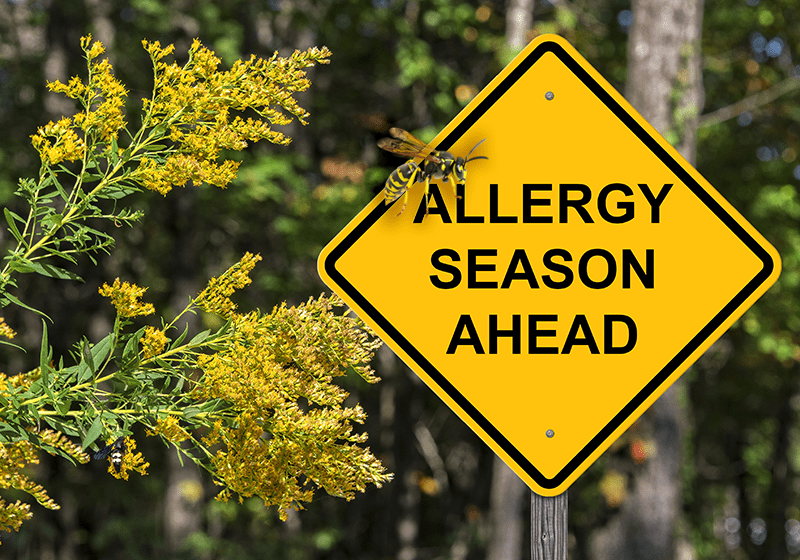By Janice Harvey, RPh, CDE
Soon the flowers, trees, grasses, and weeds will come out of their winter slumber, releasing their pollens into the springtime air. Bees and other insects will do their part to spread the pollens. And many people will experience allergy symptoms, such as a runny nose, sneezing, and itchy, watery eyes. For some people, the symptoms might be more severe, including localized swelling and difficulty breathing after a bee or wasp sting. In these cases, allergen avoidance may not be possible.
If your allergies are predictable or severe, then you might want to consider other options to prevent reactions.
Plan ahead for allergy season
Start medications early. Most people use allergy medications after they already have allergy symptoms. However, starting an antihistamine before exposure and using it regularly will be more effective, as this will prevent the release of histamine and other chemicals that cause allergy symptoms. There are many over-the-counter antihistamine options, and cetirizine is also available by prescription.
If appropriate, use a combination product. Taking both an antihistamine and a decongestant may be more effective than either medication alone. Consult with one of our pharmacists before using oral or nasal decongestants, as there are side effects and health condition/drug interactions that may need to be addressed.
Use the most effective option. Corticosteroid nasal sprays are the most effective option for nasal allergy symptoms and offer a modest benefit for itchy, watery eyes (ocular rhinitis). They do start to work within 6 to 8 hours of the first dose, but it can take a few weeks to achieve the maximum effect. Because of this, regular use is more effective than using only when needed. Another option is a combination antihistamine–corticosteroid nasal spray. In terms of effectiveness for relief of nasal symptoms, it is similar to oral antihistamines.
Prevent asthma and allergies. For people with asthma that is worsened by allergies, the medication montelukast may be an option. It works by blocking certain natural substances (leukotrienes) that may cause or worsen asthma and allergies. It needs to be taken regularly and it doesn’t work right away. Since there are other allergy medications that may be safer (have fewer side effects), montelukast should only be used if you can’t take other allergy medications or they don’t work well.
Choose a product for specific symptoms. For eye symptoms, there are many eye drops available. Cromolyn eye drops block histamine release during an allergic reaction. It can take several days of continued use for symptom relief and up to 6 weeks for full benefit. For more immediate relief of symptoms, other eye drops containing antihistamines, decongestants, or nonsteroidal anti-inflammatory drugs might be used along with cromolyn eye drops until full benefit can be achieved.
Reduce allergen exposure. Saline nasal rinses offer a non-drug option. They work by flushing out allergens and excess mucus from inside the nasal passages. This can limit the amount of exposure to allergens, while also reducing congestion.
Immunotherapy for severe allergies
Individuals with severe allergies will often be referred to an allergist. After testing, the allergist may prescribe allergen immunotherapy, available as tablets or injections. We are able to special-order these medications. They are expensive, but many third-party plans will cover them and they do qualify for BC PharmaCare coverage.
Allergy tablets (sublingual immunotherapy, SLIT) are dissolved under the tongue once a day for several months. There are tablets available for specific allergies, such as grass pollen, trees, ragweed pollen, and dust mites. This option is convenient, as regular visits to the allergist’s office are not usually necessary. Most people will see significant improvement after a few months of treatment.
Allergy shots (subcutaneous immunotherapy, SCIT) are given as a series of injections, slowly increasing the amount of allergen injected to build tolerance and develop immunity. The injections are usually given in an allergist’s office, weekly over 2 to 3 months until the maximum dose is reached, and then monthly for 3 to 5 years. SCIT is used to treat a wider selection of allergens, including all of the allergens mentioned above, as well as pet dander and venomous insects, for example. It also provides a greater benefit, possibly even helping to prevent development of further allergies and asthma. Many people get complete relief within one to three years of starting treatment and will continue to benefit for several years after the shots stop.
How can your pharmacist help?
When you meet with our pharmacists for a minor ailments assessment, we can advise you on the best over-the-counter medication options and preventative measures for you. We can now also prescribe oral antihistamines, intranasal corticosteroids, and intranasal antihistamine–corticosteroid combinations. If it turns out that your symptoms are not related to allergies or if we determine that there’s a better medication option for you, we can outline our recommendations and provide those to your doctor or nurse practitioner.
It’s easy to schedule an appointment with us online or you can phone (250) 338-4790 to book a time that is convenient for you. We’re here to help you achieve your best health.
